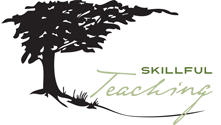The Power of Imperfection {Courageous Teaching Part 1}
Happy belated New Year, dear teacher.
I guess it’s not too late to say that since it’s still January. How’s it going, anyway? How’s 2017 been so far?
My experience is that typically this time of year has us either feeling hopeful, full of renewed energy, or frustrated and a little overwhelmed (and maybe, just maybe, feeling pretty crappy — not impossible). Sometimes all of of these things simultaneously (which happens to have been my experience these past few weeks).
We do this to ourselves though, don’t we? We get jazzed up and excited about fresh starts and big plans, but too often hold ourselves to some unacknowledged and unrealistic expectation that it’s all going to be great (and maybe easier than last time). Deep down we expect that we’ll live up to the demon voice in our heads that’s telling us “you should be able to do this,” or “you’re supposed to be able to do this,” or “you’re supposed to be better than this!” Better than what? Supposed to be able to do what, according to whom?
What it often comes down to is that we think we should be perfect. And maybe “perfect” is not your word exactly. My word is “better” — I’m supposed to be better than this/at this/at this by now… . It’s still a product of expecting something that is out of alignment with our desires, experience, or our history, the situation at hand, and certainly reality. It makes us anxious, worried, agitated, depressed, and turns all of our thoughts inward — not in a good way.
When we don’t meet these expectations of should-ness and better-ness we begin to analyze our every (mis)step, (missed) opportunity, (mis)spoken word, and (ill planned) action. Because we’re concerned that we’re falling short in some way, we don’t have room or attention to spare — not really — for anyone else. We think we’re dedicated to being our best, but really we’re fixated on not failing, on getting it right, on doing exactly what we said we’d do in the way we said we’d do it. In this iteration of our experience striving for “perfection” turns us against ourselves and away from what we really value: making a positive impact.
If you were perfect, did it all right all the time, met every deadline, could do every Pilates exercises just so, knew all the answers and made all the perfect corrections…YOU’D BE BORING. You’d also have very little, if not nothing at all, to offer anyone — especially your students.
Courageous teaching. What is it? It’s the power of imperfection. It’s the key to creativity and the conduit of curiosity. To be courageous is to be curious (when you don’t have the answer or you’re having a shitty day and you decide to show up fully anyway); to be vulnerable, willing to fail, willing to not know and still love what you do. Courageous teaching is bringing your best-self, NOT YOUR PERFECT SELF, to the moment as often as you’re able to and when you’re not able to to love yourself and what you do regardless.
This is the first part in a 3 or 4 part series (I haven’t decided yet — I often have more to say than I realize, which isn’t surprising to many of you who know me) on courageous teaching. My hope is to leave you with some small tool you can use to help you be more able to show up even on the bad days.
I just recently finished Amy Cuddy’s book “Presence: Bringing your boldest self to your biggest challenges.” Amy is the now famed TED Talk presenter and social psychologist who has dedicated her work to exploring (and proving) the connection between the body and confidence. In Presence she explores different ways we can quickly make positive change in our presence especially when we are facing difficult situations.
So, based on Amy’s work and another technique I was exposed to a long time ago, I’ve got two “pro-tips” for you. Check them out below and look for more in this series soon.

 How are you showing up? Why are you showing up? Why do you teach? What IS teaching? Why do you care? This is Skillful Teaching: A Whole-person approach to being an expert teacher, not an expert technician. There's a difference. Want to know what it is?
How are you showing up? Why are you showing up? Why do you teach? What IS teaching? Why do you care? This is Skillful Teaching: A Whole-person approach to being an expert teacher, not an expert technician. There's a difference. Want to know what it is?